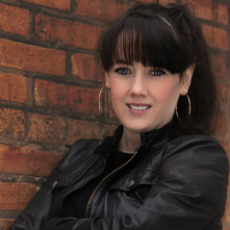Jessie Ann Foley is a teacher and writer whose first novel, The Carnival at Bray, was the recipient of a Kirkus starred review and the Sheehan Prize in Young Adult fiction. It was also selected as a 2015 Michael L. Printz Award Honor Book, and as a finalist for the 2015 William C. Morris YA Debut Award. She holds an MFA in Fiction Writing from Columbia College, and her work has appeared in Salon.com, The Madison Review, Midwestern Gothic, McSweeney’s, the Chicago Reader, Writer’s Digest, Hypertext, xoJane.com,Sixfold, Great Lakes Cultural Review and other magazines. She lives with her husband and children in her native Chicago, where she is at work on a second novel.
Chicago: The City That Gives by Jessie Ann Foley
On the Fourth of July, 2014, after the sun went down and the pyromaniacs of the neighborhood had gathered in the alleys to launch their illegal fireworks, my husband and I walked to our local bar for a drink. It was a hot night, the air hazy with sulfur and humidity, though maybe it was just me who felt hazy, having not quite adjusted to the total life-change of motherhood, of sleeplessness, of the tidal wave of anxious, consuming love that my six-week-old daughter had created in me.
My in-laws were babysitting, and this was one of our first nights out without her. Her: we rarely called the baby by her actual name; that kind of specificity was unnecessary. Like God, she was so encompassing in the world of our house that she needed no other description or designation. And it did feel, in fact, like our house had become the world, a small, isolated planet containing nothing but a spit up-stained couch, a wheezing breast pump, and a television that we never watched but also never turned off. At the center of this world was a seven pound human with a wise little face and a swirl of soft fuzz across the crown of her head, who had lately taken to waving her arms with frantic joy for no reason at all.
I’d never experienced a kind of love quite like this; still, as we shut the front door and headed out in the night, my husband and I high-fived each other like giddy high school kids who had successfully snuck out of the house. When we sat down at the counter and ordered our drinks, we got to talking to the bartender. Like all new parents, we gushed about our daughter and insisted she look at several of the 800 pictures we’d taken of her.
“It’s the best thing that will ever happen to you,” the bartender said, peering at my phone screen over her reading glasses. “Children give you such happiness. But you can kiss your freedom goodbye.”
She certainly wasn’t the first person to say this to us. Throughout my first pregnancy, I met a chorus of well-meaning advice, saying essentially the same thing: you lose your freedom, but it’s worth it. And now here we were, free to have a drink and an uninterrupted adult conversation for the first time in a long time, and what were we doing? Whipping out our phones and scrolling through pictures of our baby, cooing and awing more than actually conversing. Parenthood had invaded our hearts, and never again would we be able to walk down to the Friendly Tavern and drink there all night without consequence or guilt. Spontaneity, and the romance inherent in that, was gone from our lives. We would never be out again in quite the same way. The feeling was both frightening and wonderful.
In George Saunders' famous commencement speech to graduates of Syracuse University, he told the audience, “as you get older, your self will diminish and you will grow in love. YOU will gradually be replaced by LOVE. If you have kids, that will be a huge moment in your process of self-diminishment. You really won’t care what happens to YOU, as long as they benefit.” This self-diminishment is one of the greatest gifts our children give us. Having a child uncomplicates you. It unclutters your dreams. It used to be that in my prayers, and on birthday candles, fallen eyelashes, water fountains dotted with pennies, and stars, I would wish for various things for myself: a new job, a successful writing career, love. Now, all I ever wish for is that my two daughters have health and happiness.
We could have stayed for another drink that night—my in-laws were staying with us—but we didn’t. We didn’t know how to want to stay out all night anymore. And hours after we got home, while I lay with our daughter in the darkness and the clutter and the glow of Law and Order: Criminal Intent, wondering if I would ever get a full night’s sleep again, she looked up and smiled at me for the very first time.



Add a comment to: Guest Blog: Jessie Ann Foley on Chicago: The City That Gives